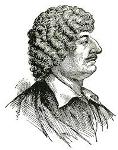iUniverse is happy to present a new installment in our “Writers Lost and Found” series, this time turning our attention to poetry. British essayist Sir Francis Bacon once wrote that “Histories make men wise; poets, witty; the mathematics, subtle”, and iUniverse wishes to encourage people to read poetry. The benefits of keeping poetry in your reading diet include the use of words that evoke the senses as well as reinforcement of how to write concisely.
 The first poet in this series is Robert Herrick, who lived a rather long life from 1591 to 1674. As a country clergyman living in a remote part of England, Herrick was rather removed from the political instability of the time – which consisted of civil war, the beheading of King Charles, a new system of government run by Puritans, and then the restoration of the monarchy.
The first poet in this series is Robert Herrick, who lived a rather long life from 1591 to 1674. As a country clergyman living in a remote part of England, Herrick was rather removed from the political instability of the time – which consisted of civil war, the beheading of King Charles, a new system of government run by Puritans, and then the restoration of the monarchy.
Herrick is often overlooked in anthologies and is often given minimal inclusion. He tends to be sandwiched between George Herbert, a religious poet of the same time period, and John Donne, whose “metaphysical” poetry has gained in popularity in the last half century and is highly prized by the academic establishment. Many anthologies only include Herrick’s most famous poem, “To the Virgins, to Make Much of Time”. The poem carries the theme of carpe diem, Latin for “seize the day”.
There are many qualities that make Herrick a great poet to read. For one, there is a great variety of topics to his poetry, ranging from pagan household gods, imaginary young female lovers, religion, friendship, eating, drinking, and festivals. His diction is more modern than that of Shakespeare and often very direct, though he is able to use words in unique and stimulating ways. One example is in the short poem “Upon Julia’s Clothes”, when Herrick writes,
Whenas in silks my Julia goes,
Then, then methinks how sweetly flows
That liquefaction of her clothes.
Here, Herrick appeals directly to our senses, with a very palpable imagery, and also uses the rare word “liquefaction”. This creative combination of metaphor and diction can be found in many of his works.
Herrick also was one of the first English poets to celebrate rural life. He captures the festivals of England’s countryside folk in poems such as “Corinna’s Going a-Maying”, fusing his sophisticated versification with the theme of pastoral contentment and simplicity. His general positivity and humor also make him a pleasant poet to read.
While most of Herrick’s poems can be found in his collection, Hesperides, here are some suggested poems to check out online, in addition to those mentioned above:
- Upon Julia’s Voice
- Delight in Disorder
- A Dialogue Betwixt Himself and Mistress Eliza Wheeler
- To Anthea Who May Command Him Any Thing
- The Night Piece, to Julia
- To His Muse
- To Silvia, To Wed
- For a complete list, check out http://www.gutenberg.org/files/22421/22421-h/i.html
Make sure to check out the iUniverse site for more advice and blogs, as well as iUniverse Facebook and iUniverse Twitter.
Related posts:
We at iUniverse are always delighted to hear great reviews of our services. Check out the testimonia...
iUniverse Book Publishers has recently been talking about using social media in book marketing and w...
iUniverse author Cheryl Pontius tells us about hew new book, Single Parents Unite. Please briefly...

